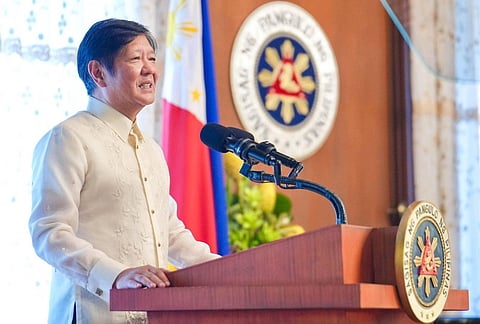
- NEWS
- the EDIT
- COMMENTARY
- BUSINESS
- LIFE
- SHOW
- ACTION
- GLOBAL GOALS
- SNAPS
- DYARYO TIRADA
- MORE

Following an overwhelming mandate of 31 million votes, President Ferdinand R. Marcos Jr. returned to Malacañang last year. However, before assuming the presidency, he had an extensive career in public service, particularly as a legislator.
Marcos dedicated more than 25 years to public service, with a significant portion spent as a legislator. He served as the Ilocos Norte 2nd District representative from 1992 to 1995 and from 2007 to 2010. Additionally, he held a senatorial position from 2010 to 2016.
During his initial term in the House of Representatives, Marcos demonstrated his commitment to legislative work by authoring 29 bills and co-authoring 90 others. His contributions played a vital role in establishing the Department of Energy and the National Youth Commission.
Furthermore, Marcos' notable achievements include the authorship of Republic Act 9522, also known as the Philippine Archipelagic Baselines Law, during his final term as the Ilocos Norte 2nd District representative. This legislation holds great significance in shaping the country's maritime boundaries.
According to his biography on the Senate website, Marcos also prioritized the advancement of his province by allocating a substantial portion of his Countryside Development Fund to the establishment and organization of cooperatives for teachers and farmers.
President Ferdinand R. Marcos Jr. possesses a wealth of legislative experience and a significant track record of accomplishments, both within the halls of Congress and in his dedication to the development of his province.
During his single six-year term in the Senate, President Ferdinand R. Marcos Jr. demonstrated his legislative prowess by authoring and co-authoring 122 bills, with 15 successfully enacted into law.
According to information from Marcos' official website, a report by spot. stated that most of the measures championed by Marcos during his time as a senator focused on local issues and concerns.
The report highlighted that the local measures authored by Marcos aimed to establish cityhood for certain towns, facilitate the reapportioning of legislative districts, declare local holidays, and rename roads after historical figures.
Furthermore, Marcos' legislative contributions extended to national matters as well. Notable among the measures he authored were Republic Act 10586, also known as the Anti-drunk and Drugged Driving Act of 2012; RA 10176, the Arbor Day Act; RA 10606, the National Health Insurance Act; RA 10175, the Cybercrime Prevention Act of 2011; RA 10530, the Red Cross and Other Emblems Act of 2012; and RA 10364, the Expanded Anti-Trafficking in Persons Act of 2010.
In addition to these significant pieces of legislation, Marcos also advocated for the passage of RA 10821, the Children's Protection in Motor Vehicles Act of 2016, and RA 10687, the Unified Student Financial Assistance System for Tertiary Education Act.
His tenure as a senator was marked by his commitment to addressing local and national issues, as evidenced by the broad range of bills he authored and co-authored during his six-year term.
Among the various impactful measures that President Ferdinand R. Marcos Jr. championed during his tenure as a senator, several noteworthy ones stand out. These include:
Additionally, President Marcos authored several other significant acts during his tenure, including:
Marcos Jr.'s legislative initiatives encompassed a diverse range of issues, from safeguarding the welfare of children and the youth and protecting the rights of various groups to promoting infrastructure development for the betterment of the nation.
